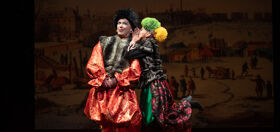 A study is published in the October issue of the American Journal of Orthopsychiatry indicates that high-risk children adopted from foster care do equally well when placed with gay or heterosexual parents.
A study is published in the October issue of the American Journal of Orthopsychiatry indicates that high-risk children adopted from foster care do equally well when placed with gay or heterosexual parents.
Psychologists from UCLA studied 82 at-risk children, from ages 4 months to 8-years-old, in Los Angeles County. Sixty of those kids were placed with heterosexual parents and 22 with gay or lesbian guardians—15 with gay male parents and seven with lesbian parents (68% of all parents were married or living with a partner).
The psychologists found very few differences among the children at any of the assessments over the two-year period following placement. On average, children in heterosexual, gay and lesbian households achieved significant gains in their cognitive development, and their levels of behavior problems remained stable. Their IQ scores increased by an average of 10 points, from about 85 to 95 — a large increase, from low-average to average functioning.
While all the children had multiple risk factors—including premature birth, prenatal substance exposure, abuse or neglect, and multiple prior placements—but the children adopted by gay and lesbian families averaged at least one additional factor.
“The children adopted by gay and lesbian parents had more challenges before they were adopted and yet they end up in the same place, which is impressive,” said UCLA’s Letitia Anne Peplau, who co-authored of the study.
How about we take this to the next level?
Our newsletter is like a refreshing cocktail (or mocktail) of LGBTQ+ entertainment and pop culture, served up with a side of eye-candy.



















conrad charleston
I think what makes gays and lesbians such potentially good matches for at risk young people is their ability to empathize with the emphasized “at-risk” category. Many queer people know what it means to be stigmatized and thought of differently than their straight counter parts… We’re like island of misfit toys cheerleaders. 🙂
technicolornina
Conrad, I agree, but I’d take it a step further: gay people, on the whole, have to fight for children. We can’t just get knocked up by our partner the night we forgot the condom–for us, kids involve in vitro, surrogates, adoption, etc. You always cherish things that are harder to get. I would say that on top of the built-in empathy, there’s a built-in protectiveness–you’re going to care for that child because of the battle it took to get him or her. (And I say that as someone who’s childfree.)
Billysees
@conrad charleston:
@technicolornina:
Both of your comments make much sense.